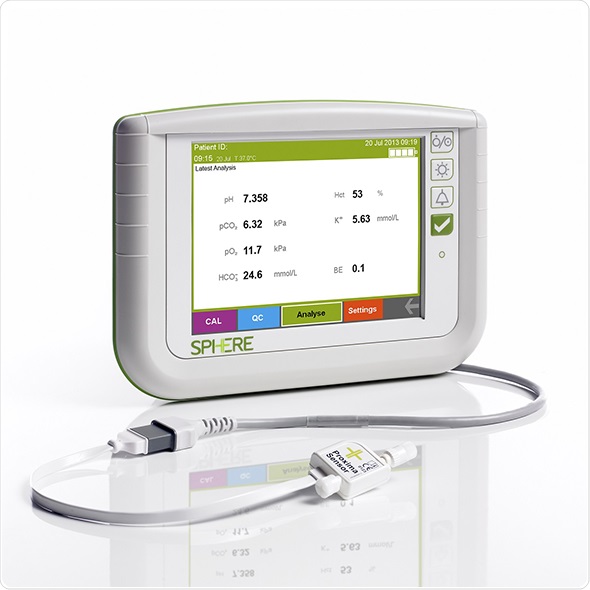Patient-dedicated system supports rapid and frequent bedside blood gas measurements at critical times
The new Proxima in-line patient-dedicated blood gas analyser incorporates Proxima Sensor (in foreground) and dedicated bedside monitor

Sphere Medical, innovator in critical care monitoring and diagnostics equipment, will launch its ground-breaking in-line patient dedicated arterial blood gas analyser in Germany, Netherlands and Belgium at ISICEM 2015. The new Proxima miniaturised blood gas analyser will be seen in mainland Europe for the first time on Stand 1.35 at the 35th International Symposium on Intensive Care and Emergency Medicine (ISICEM), Brussels, 17-20th March 2015. The advanced Proxima System uniquely delivers true point-of-care testing (POCT) by enabling critical care staff to obtain frequent laboratory accurate blood gas measurements without leaving the patient’s bedside. This facilitates effective and timely clinical decisions for proactive critical care.
The CE marked Proxima revolutionises conventional POCT as it is attached directly to the patient through their arterial line. The miniature Proxima Sensor, containing a range of biological sensors, sits in series in the arterial line with the blood pressure transducer. For the first time, blood gas results can be delivered, like blood pressure results, within the patient’s bed space.
Simple to use, the Proxima System enables closed blood sampling and is operated via the touch screen interface of its dedicated bedside monitor. When an arterial blood gas analysis is required, blood is withdrawn from the patient directly into the Proxima Sensor and a panel of analytes is measured. All blood is returned to the patient, promoting blood conservation and reducing the possibility of hospital acquired anaemia and subsequent transfusions. The disposable sensor can be used for monitoring blood gases and electrolytes over a 72 hour period as many times as required.
Clinical validation in ICU
Proxima has been fully evaluated and validated in a clinical setting. A recent observational method comparison study at Queen Elizabeth Hospital, Birmingham, UK, confirmed excellent agreement between Proxima and standard bench top blood gas analysers at the hospital, measuring various arterial blood parameters of intensive care unit patients with a range of clinical conditions, including trauma, head injury, post-surgical recovery and sepsis.
Commenting on the clinical importance of Proxima, Dr. Tom Clutton-Brock, Senior Lecturer Anaesthesia and Intensive Care Medicine, University Hospital Birmingham, said, “Rapid return of data and swift response to changing blood gases is as essential in patient care as the continual measurement of blood pressure. Fast feedback and response could have a real impact on efficiently stabilising patients or weaning them from mechanical ventilation.”
ISICEM Clinical Presentations
Dr. Clutton-Brock will be presenting at ISICEM 2015 on ‘Bedside Blood Analysis’ within the Respiratory Monitoring Session, Salle M, 8.15am, Friday 20th March. This will discuss how frequent measurement of arterial blood samples is a key component in the effective management of patients in the critical care environment, particularly for those that are unstable. A scientific poster has also been accepted for presentation at ISICEM; ‘Evaluation of a patient dedicated blood gas analyser’ by Dr. Clutton-Brock and Dr. Jess Fox (Sphere Medical) will discuss the excellent results of the Queen Elizabeth Hospital method comparison study.
For more information on Sphere Medical and the Proxima in-line blood gas analyser, please visit Stand 1.35 at ISICEM 2015, Brussels, 17-20th March 2015.
Source: Sphere Medical